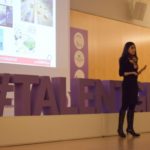How a family logistics company became a multinational technology firm
From a small town in Burgos province, the mobile robotics engineering firm ASTI shows that digitization provides an opportunity to restore the fabric of industry.

Veronica Pascual is a rare bird in the Spanish business world. Not yet 40 years old, she has for the past decade managed ASTI, the company her parents founded.
So far, nothing out of the ordinary. But because of her field —engineering and mobile robotics— and the location of her company —in Madrigalejo del Monte, a small town in north-central Burgos province— Pascual´s case and that of ASTI are unique. She took the reins of a family-owned logistics business and turned it into a small technology multinational: 60% of its 20 million euros in annual sales come from international markets.
ASTI (Automatismos y Sistemas de Transporte Interno) was founded in 1982. Twenty-four years later, when her professional plans were aimed in another direction, Pascual had to take over the family business, which had run into difficulties. An aeronautical engineer by training, she left her international career at the French builder Bouygues, for which she had worked in France and the United Kingdom, and left Paris for Madrigalejo del Monte.
“We worked for two years with the goal of simply getting back on our feet. Then it was time to decide how to move forward. In 2008, I bought all the shares in the company.” From that moment on, ASTI has been based on three pillars: technology, internationalization and talent. Everything is done with the same determination that Pascual displays when explaining her business case: “In the 2012-2016 Strategic Plan, we met our objectives: to multiply turnover by five and the workforce, by 2.5, to the current level of 180 people.”
The pace, says Pascual, cannot be slowed. From 2016 to 2020, turnover must again increase fivefold and the workforce be tripled. Too ambitious? “Not at all. The business is growing and you have to maintain the same pace of growth. If you don´t, you open cracks for competitors to fill. Growing at this pace is the minimum we can do,” she says.

Verónica Pascual, owner of ASTI
The pace, says Pascual, cannot be slowed. From 2016 to 2020, turnover must again increase fivefold and the workforce be tripled. Too ambitious? “Not at all. The business is growing and you have to maintain the same pace of growth. If you don´t, you open cracks for competitors to fill. Growing at this pace is the minimum we can do,” she says.
Apart from the obvious technological advances, what makes the ASTI that Pascua inherited different from the one she´s trying to build? “The mission is still the same: to help our clients be more competitive in the automatization of internal logistics processes.” But everything else has changed considerably.
One of the first decisions made in the company´s new era was to “bet on driverless cars, the so-called AGVs (Automated Guided Vehicles) and try to internationalize the business through industrial partners that we already had outside Spain.” It wasn´t a matter of organic growth, but of paradigm change. “I believe in creating collaborative ecosystems, so we started partnering with companies with which we have complementary products along the value chain.” Also, the company developed its own software for the interaction between the robots and the devices that it supplies to clients.
Working for companies such as Renault Trucks, PSA Peugeot Citroën, Pepsico, Michelin, Procter & Gamble and Pfizer, ASTI is today present in 15 countries in Europe and the Americas and has just opened its first 100% operational subsidiary in France’s Alsatia region. France is the source of 40% of ASTI’s revenues and the company also wants to also strengthen its business in Switzerland and Germany.
An in-house academy
But the internationalization of a business doesn´t consist only of entering new markets; it also takes place at home. “We have eight nationalities represented at the company and this, to me, is very important, because if our client is the world, we not only have to know the language of the world, but also have a global mentality.”
The other bulwark of her management is attracting talent, which ASTI does by seeking out students who have not even entered the university, “because by then, it could already be too late,” to awaken their potential. “We have an academy with 30 students in Professional Training, to whom we give overall instruction; 60% end up joining our workforce,” she says, enthusiastically.

Veronica Pascual, giving one of the classes in the STEM Talent Girl program.
In addition, ASTI has agreements with European and U.S. universities, so that its students can spend time training at the company and develop all types of activities among the workforce, “including in the human sphere, such as mindfulness, empathetic communication… we want to transform the industry, and that implies changing the relationship between people and machines. That’s why we need these kinds of skills.”
Pascual’s vision of the future of employment in the industry is optimistic: “With talent and work, the same thing occurs as with energy; it´s not created or destroyed, it’s simply transformed. We must understand that the paradigm of the digital economy and Industry 4.0 is not to do what you were already doing, but automatically; it means doing it differently so as to add much more value. And I believe that in Spain and in Europe digitization provides an opportunity to once again attract industry, not just to maintain installed industry,” says Pascual, who is also the president of the Industry 4.0 Commission in the Association of Electronic, IT, Telecommunications and Digital Content Companies (Ametic).
As a woman working in two spheres dominated by men —engineering and business— Pascual is aware of the need to close the gender gap in STEM (Science, Technology, Engineering and Mathematics). She is trying to contribute a specific program for girls 14 years of age and up —STEM Talent Girl—, who attend master classes given by women who are leaders in technology companies, as well as “job shadowing” sessions. “At a decisive moment, when they have to decide what they are going to do with their lives, we give them lots of models to follow,” she says proudly.
These kinds of programs “are not just for ASTI. I believe we are all responsible for what is happening in society and that what we have to do, from our humble position, is to work towards transforming reality, with all those who are not content to place the blame on a third party.